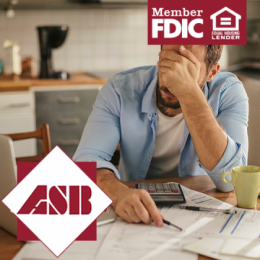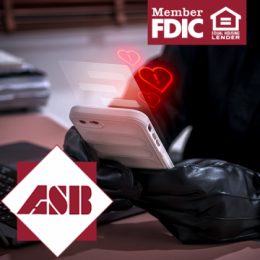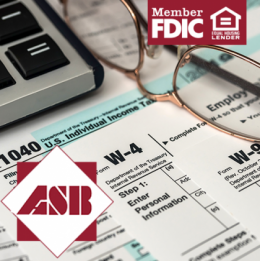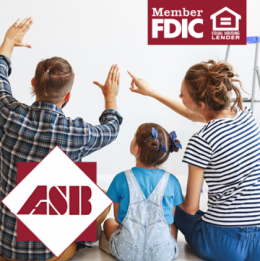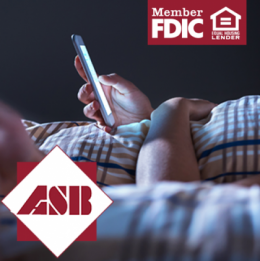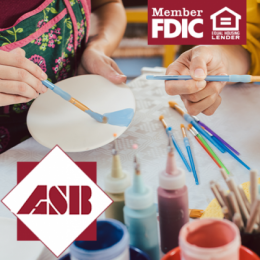
Congratulations – you've done it, Graduate! Whether you’re wrapping up high school, starting your first job, or preparing to leave for college, one thing is true: you’re about to take a big step toward financial independence.
Getting your first credit card might seem like a rite of passage — and it is. But it’s also a responsibility. Credit cards can be incredibly helpful tools when used wisely. But they can also lead to major headaches if you’re not sure how they work.
At American State Bank, we’re proud to help young Iowans build strong financial habits from the start. If you (or your teen) are thinking about opening a first credit card, here are the lessons every young adult should know before swiping.
1. Credit Isn’t Free Money
We get it; having a credit card feels exciting. It’s easy to think of it like “extra” spending money. But this is lesson number one: a credit card is not free money.
When you make a purchase on a credit card, you’re borrowing money from the bank or card issuer. And unless you pay that amount back in full by the due date, you’ll be charged interest on what you owe. That interest adds up fast.
Here’s the catch:
- Average credit card interest rates are often over 20%
- If you only pay the minimum amount each month, you’ll spend a lot more in the long run
Smart tip:
Only use your card for purchases you know you can pay off in full. If you can’t afford to pay for something in cash today, it might not be the right time to charge it.
2. Paying On Time Is Everything
If you remember just one thing about using a credit card, let it be this: always pay your bill on time.
Late payments:
- Hurt your credit score
- Can stay on your credit report for up to seven years
- Often come with late fees or penalty interest rates
Smart tip:
Set up automatic payments for at least the minimum amount or set calendar reminders a few days before your due date. With ASB’s mobile banking app, you can easily check your balance and due dates on the go.
3. Your Credit Score Starts Here
Your credit score might not seem like a big deal right now — but it will be. Credit scores are like report cards for how you manage money, and they start building the minute you open your first line of credit.
Why your credit score matters:
- Landlords check it before approving apartment applications
- Lenders use it for car loans and future credit cards
- Some employers even look at credit history during hiring
Smart tip:
Using a credit card responsibly — keeping your balance low and paying it off on time — can help you build a solid credit score right from the start.
4. Start Small With Smart Spending
You don’t need to put everything on your card. In fact, you shouldn’t.
One of the best ways to build healthy credit habits is to start small. Use your card for one or two predictable expenses each month, like:
- Gas for your car
- A streaming subscription
- Groceries or other essentials
Smart tip:
Treat your card like a debit card — only spend what you already have in your checking account.
5. Know Your Credit Limit (and Stay Under It)
When you open a credit card, you’ll be given a credit limit — the maximum amount you can borrow at one time. But just because you have a $1,000 limit doesn’t mean you should spend $1,000.
Why it matters:
- Using too much of your available credit can lower your credit score
- It’s easy to get overwhelmed if you max out your card and can’t pay it back quickly
Smart tip:
Try to keep your balance below 30% of your total limit. That means if you have a $1,000 credit limit, aim to stay under $300 at any given time.
6. It’s Okay to Ask Questions
Let’s be honest — credit cards come with a lot of fine print. APRs, billing cycles, grace periods…it’s a lot to learn all at once.
If you’re unsure about how something works, ask for help. Whether it’s a parent, guardian, teacher, or one of our friendly ASB bankers, there’s always someone who can help you navigate your options.
Smart tip:
When in doubt, call or visit your local ASB branch. We’re always happy to walk you through how credit works — no judgment, no pressure.
7. An ASB Credit Card Is a Smart Way to Start
At American State Bank, we offer credit cards that are designed with real people (and real budgets) in mind. If you’re just starting out, we can help you choose a credit card that fits your needs, with features like:
- Low interest rates
- Simple, easy-to-understand terms
- Fraud protection and mobile alerts
- A local team to support you every step of the way
Whether you’re heading to college or managing your first job, an ASB Credit Card can help you start building your credit the right way — without the surprises.
Quick Recap: Credit Card Lessons for Teens
Here’s a quick checklist to keep in mind:
- Credit isn’t free money – Only charge what you can afford to pay off
- Always pay on time – Avoid late fees and protect your credit score
- Start building credit now – Your future self will thank you
- Keep spending simple – Stick to one or two small, predictable expenses
- Know your limit – Don’t max out your card
- Ask questions – Learn as you go, and don’t be afraid to speak up
- Choose the right card – A local bank like ASB can help you find the best fit
Start Strong With Smart Habits
Getting your first credit card is exciting — and a little intimidating. But with the right mindset, tools, and support, you can use credit to your advantage. The habits you build now will shape your financial future for years to come.
At American State Bank, we believe that local support makes a big difference. We’re proud to help young adults in Iowa learn smart financial habits and take control of their future one decision at a time.
Ready to take your next step?
Open a credit card with American State Bank and start building your credit with confidence.
Budgeting Financial Literacy Mobile Banking Online Banking Students Tips
May 20, 2025 by American State Bank

